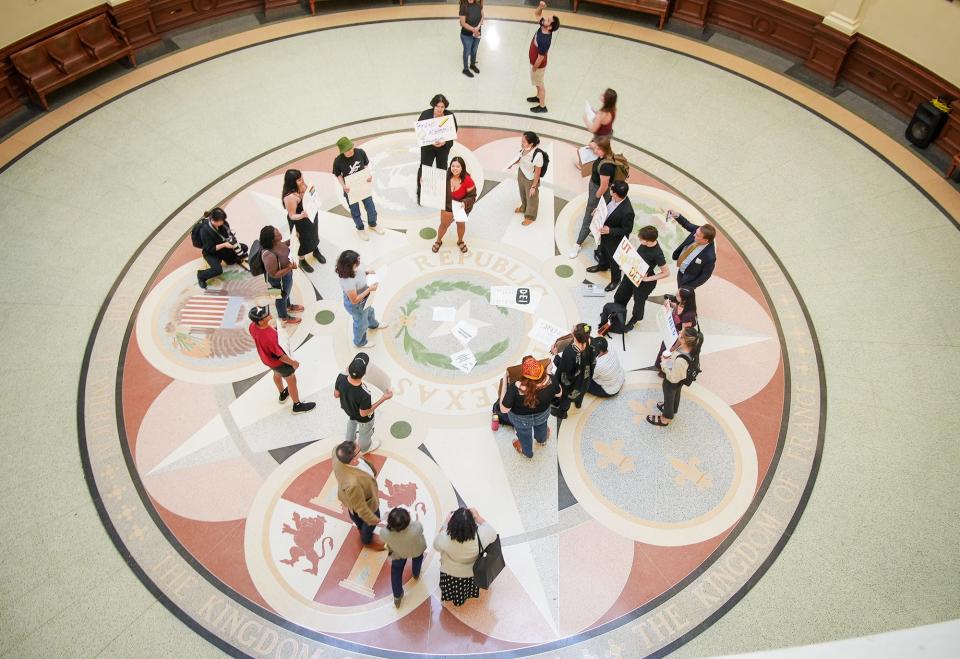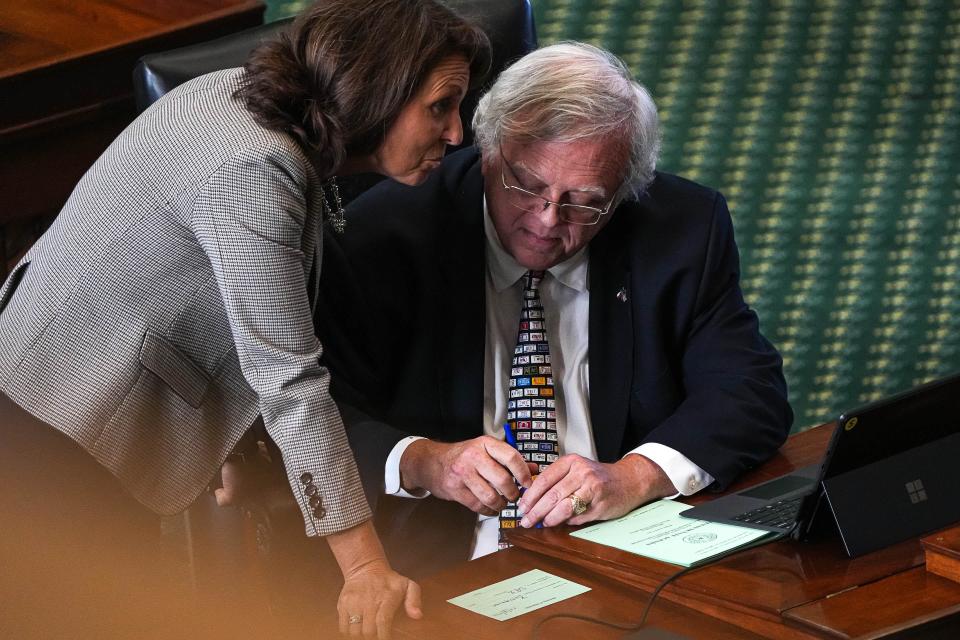The new year rings in new Texas laws. Here's a look at some rules going into effect Jan. 1
As a marathon year for Texas lawmakers comes to a close, many bills passed during the 88th legislative session — from the regular session in spring to several subsequent special monthlong sessions — will go into effect with the start of the new year.
From tax exemptions and new penalties for electronic cigarette manufacturers to a diversion program for at-risk youth and a new specialty license plate, here is a look at several laws going into effect Jan. 1.
Diversity, equity and inclusion ban at Texas colleges
A state ban on programs and policies "designed or implemented in reference to race, color, or ethnicity" at Texas public universities and colleges will begin Jan. 1, with institutions of higher education no longer being able to have diversity, equity and inclusion offices or initiatives.
The law bans campuses from housing "training, programs or activities implemented in reference to race, color, ethnicity, gender identity or sexual orientation."
The Republican-dominated Legislature during the regular session passed Senate Bill 17 despite opposition from Democratic lawmakers, university faculty members and students, who feared this law would eliminate initiatives that help people of color feel more included and thrive on campuses.

A priority issue for Lt. Gov. Dan Patrick, who oversees the Texas Senate, and Republican lawmakers, the Legislature passed SB 17 to end race-based programs that GOP lawmakers say are divisive, work against inclusion and have a "chilling effect" on faculty and student speech.
More: UT System sets rules to comply with new Texas tenure, anti-DEI laws
Ahead of the law's start, universities have begun preparing to comply with the DEI ban. The University of Texas has taken measures to rename and eliminate programs that will be outlawed under SB 17.
An internal document obtained by the American-Statesman in late December indicates UT's Division of Diversity and Community Engagement — which was set up to create an inclusive community on campus and encourage a robust learning environment — will be renamed the Division of Campus and Community Engagement.
“We really want to make something crystal clear, whether you like the policy or whether you like this law or any other law, the University of Texas System is going to respect the process, and we're going to respect the law,” UT System Chairman Kevin Eltife said during a November regents meeting as he addressed some of the changes the schools in the system will have to make.
“We're not going to look for loopholes. We're not going to look for workarounds. We're going to implement the law as passed,” he said.
Texas franchise tax exemption doubles
As part of an omnibus property tax relief package the Legislature approved during its second special session over the summer, SB 3 will afford nearly 70,000 businesses in Texas a total exemption from the state's franchise tax.

Under the bill authored by Sen. Paul Bettencourt, R-Houston, and signed onto by nearly all Senate members, the state's franchise tax exemption will double, allowing up to $2.47 million of an entity's total taxable revenue to be exempted from franchise taxes.
According to an analysis of the bill, the increase from the previous $1.235 million exemption will totally eliminate annual franchise taxes for about 67,000 small to medium-sized businesses.
SB 3 also will no longer require businesses that don't owe franchise taxes to file a "No-Tax-Due franchise tax return" as part of an effort to "save businesses time and money associated with preparing returns."
More: Texas voters give resounding approval to $18 billion property tax cut in November election
Youth diversion program
In an effort to identify and respond to mental health concerns of at-risk youth, lawmakers approved House Bill 3186 as a step in early intervention through a diversion program for children who have been accused of low-level offenses.
The Texas Youth Diversion and Early Intervention Act grants judges the authority to wave youth's penalties for Class C misdemeanors in favor of the new intervention program, which allows local governments to implement a series of steps ranging from rehabilitation services, alcohol and drug awareness programs, job trainings and self-improvement programs.
Currently, courts in Texas are only allowed to order a diversion program for youth offenders if the case has been finalized with a conviction or deferment, but HB 3186 will allow the diversion option at the start of the judicial proceeding.
More: Austin re-opens former downtown Salvation Army shelter, now operated by Urban Alchemy
"Municipal and justice courts have become the first line of response for these cases due to the civil courts' inability to accommodate the high volume," the bill's analysis says.
With bipartisan support, the legislation references events like the 2022 mass shooting at Robb Elementary School in Uvalde that left 19 students and two teachers dead as a reason to increase "awareness about the importance of identifying and responding to at-risk youth and those with mental illness."
Penalties for e-cigarette advertising to minors
Born out of a drastic increase in teen vaping rates over the last decade, lawmakers passed HB 4758, which creates a new criminal offense for e-cigarette marketing and advertising geared to appeal to minors.
The bill creates a Class B misdemeanor for e-cigarette ads or packaging created to market the product to minors. High school student vaping rates skyrocketed nationally from 1.5% in 2011 to 27.5% in 2019, but they declined to 14.1% in 2022 and 10% this year, according to statistics from the Annual National Youth Tobacco Survey.

"The Department of State Health Services determined that e-cigarette use had reached epidemic status among teens back in 2018," lawmakers wrote in detailing the bipartisan bill.
E-cigarette manufacturers could be penalized under the new offense for "marketing, advertising, selling, or causing to be sold an e-cigarette product in certain containers that are designed to appeal to minors."
'Texas, Our Texas' license plates up for grabs
Texas drivers will have the option to ride with a new specialty license plate after the Legislature approved a nod to the 100th anniversary of the state song.
More: Texas voter registration guide: What you need to know to vote in the 2024 primary election
The "Texas, Our Texas" license plates issued by the Department of Motor Vehicles will include the song's namesake as well as honor the 100th birthday of the tune with the dates 1924-2024. In 1929, the Legislature officially recognized "Texas, Our Texas" as the state song, which was reaffirmed by lawmakers in 1993.
Online records, notarization
A few small changes to how Texans can notarize documents, receive information on property tax appraisals and confirm health care insurance coverage also passed through the Legislature.
Requiring appraisal districts and taxing units to make available on their websites estimated amounts of owed property taxes, HB 3273 is an effort to "enhance transparency" on property tax rate changes by requiring email updates for property owners.
Prior to the mandated email and database updates, taxing entities were forced to mail postcards of the information, which cost large metropolitan counties over $4 million in 2022, according to legislative reports.
Meanwhile, HB 4500 will create an online system for physicians and health care providers to have "greater predictability" in working with patients by requiring health benefit plan issuers to track and make available insurance coverage information.
After allowing documents to be notarized online beginning in 2018, lawmakers will continue to allow notarization provisions and accommodations for online signatures. Under SB 1780, remote online notarizations will remain an avenue for Texans to notarize documents without having a witness and the signer in the same physical space.
This article originally appeared on Austin American-Statesman: From taxes to vaping, a look at Texas laws going into effect in 2024

